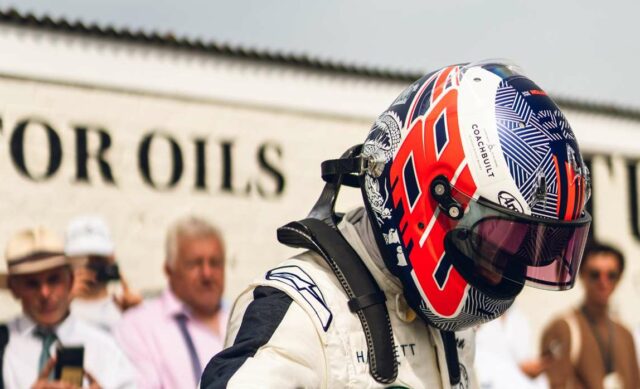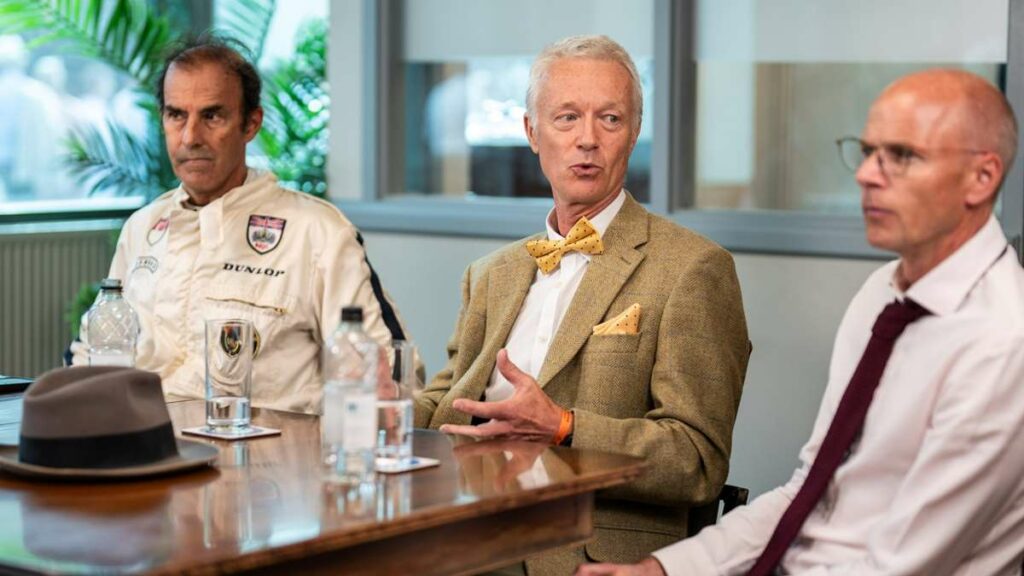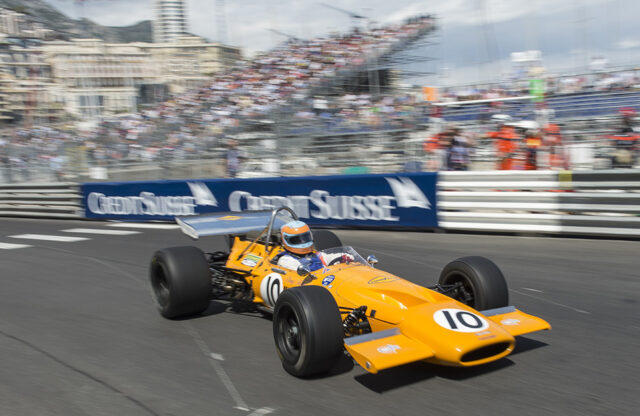WORDS: ELLIOTT HUGHES | PHOTOS: GOODWOOD
On the face of it, nothing particularly unusual was afoot when 30 pre-1966 Porsche 911s took their place on the grid for the Fordwater Trophy during Goodwood Revival 2023. The same goes for the race itself, which turned out to be the door-banging festival of oversteer everyone hoped for – particularly with a star-studded entry list that included the likes of Mark Webber, Jenson Button and Tom Kristensen.
Yet beneath all the Goodwood glamour and gladiatorial duels, history was being made. That’s because this year’s Fordwater Trophy was the first race in Revival history to be run entirely on environmentally sustainable fuels. It was an important moment for not only Goodwood but motor sport in general, as the race proved that piston-powered racing series can have a future despite the inexorable rise of EVs and the spectre of climate change.
Magneto joined five-time Le Mans winner Emanuele Pirro, Porsche specialist Richard Tuthill and CEO of Anglo American Oil Anders Hildebrand to hear about how e-fuels can protect motor sport, the classic car industry and mobility in general as we head into the uncertainty of the next decade.

We’re in the phase of showing that you don’t need crude oil


“Our business sells fuel for plant-machinery equipment, and we sell diesel and natural gas to Transport for London, but our passion is racing,” Anders explains. “So we’ve been looking at what we can do to create a fuel that doesn’t eat away at engine components such as carburettors. Even current pump fuel with only five to ten percent ethanol is a big problem for classics because the ethanol absorbs moisture, becomes acidic and then aggressively attacks the metals in the engine.”
Richard concurs: “The current fuels from the pump are not brilliant for carbureted cars, particularly if you leave them standing for a long time. So, we do face some challenges.
“Because we have been involved in a lot of areas, we have gained a lot of knowledge about what you need to do to create sustainable fuel that doesn’t damage the fuel system, dilute into the oil, cause bearing seizures etc.
“Our fuels don’t contain any ethanol, but all the bicomponents are based on it. We stood back and looked at the fuels other companies have created, and spoke to those affected by what they have missed. We then made the fuel that we are premiering at Goodwood, and I’m very pleased because the ingredients have stopped anything nasty from happening, and we have even gained power.”
But what makes Anglo American Oil’s fuel sustainable? “What makes a fuel sustainable is that you make it from ethanol from waste products from the production of food. That is key, because it means that you’re not taking crops that could be eaten or cutting down rainforests,” Anders explains.

The bio-based sustainable fuels used in the Porsche 911s reduce CO2 emissions by around 65 percent, and are mixed with traditional fuel. Anders sees this as a precursor to the entirely carbon-neutral e-fuels that companies such as Porsche and Zero Petroleum have been developing in recent years.
“We can definitely do better than bio-based fuels. The next step is e-fuels, and we are already a shareholder in Paddy Lowe’s Zero Petroleum, which is one of the major companies at the forefront of this.”
E-fuels are created by splitting water into hydrogen and oxygen. Hydrocarbons, the main component of petrol, are created when that hydrogen is combined with atmospheric carbon dioxide. These chemical reactions are fuelled by electricity, which is why Porsche chose the windy hills of Chile to renewably power its e-fuel production facility.
“We’re in the phase of showing that you don’t need crude oil. E-fuel is the ultimate, and it is extremely expensive now, but perhaps within ten to 20 years its price will be at parity with crude oil. We don’t have to scrap the millions of cars that are on the road,” Anders concludes.
Richard, who was tasked with preparing a fleet of 911s that ran in the Fordwater Trophy, explained the encouraging and seamless transition to sustainable fuel: “We are running ten cars this weekend, and I’m pleased to say that there are no adverse effects. The cars have reacted very well to it. I wish I could make it sound really, really difficult, but it isn’t – just pour it in and away you go.”

On a global scale motor sport’s governing body, the FIA, has been keen to showcase the potential of sustainable fuel and e-fuels in a plethora of series. The World Rally Championship switched to 100 percent sustainable fuels in 2022, and Formula 1 is planning to introduce them alongside its new 2026 engine regulations.
Emanuele Pirro is a current member of the FIA Historic Motorsport Commission, and is passionate about the subject of sustainable fuels, but he is careful to avoid saying anything too controversial.
“All I’m saying is what I think, not the FIA,” he asserts. “It’s a rather delicate topic, and sometimes emotions and facts can be far away, and people can overreact. I think we are now in a very different world than we would have been if it were not for ‘Dieselgate’. Without Dieselgate, there would have been, in my opinion, a milder, slower and smarter introduction of electric vehicles.
“Motor sport in today’s world has a mission to show that internal combustion is not a bad thing. Unfortunately, because we burn fuel, we are in the spotlight and people think motor sport is the only sport that is bad for the environment. But if you look at a bicycle race with all the cars following, and all the vehicles that head to a football match, it isn’t that simple.
“We are in the spotlight. The impact of motor sport on global emissions is very low, but it’s our responsibility to show those who are sceptical that we can set an example.”
See out top ten highlights from the Goodwood Revival 2023 here.



